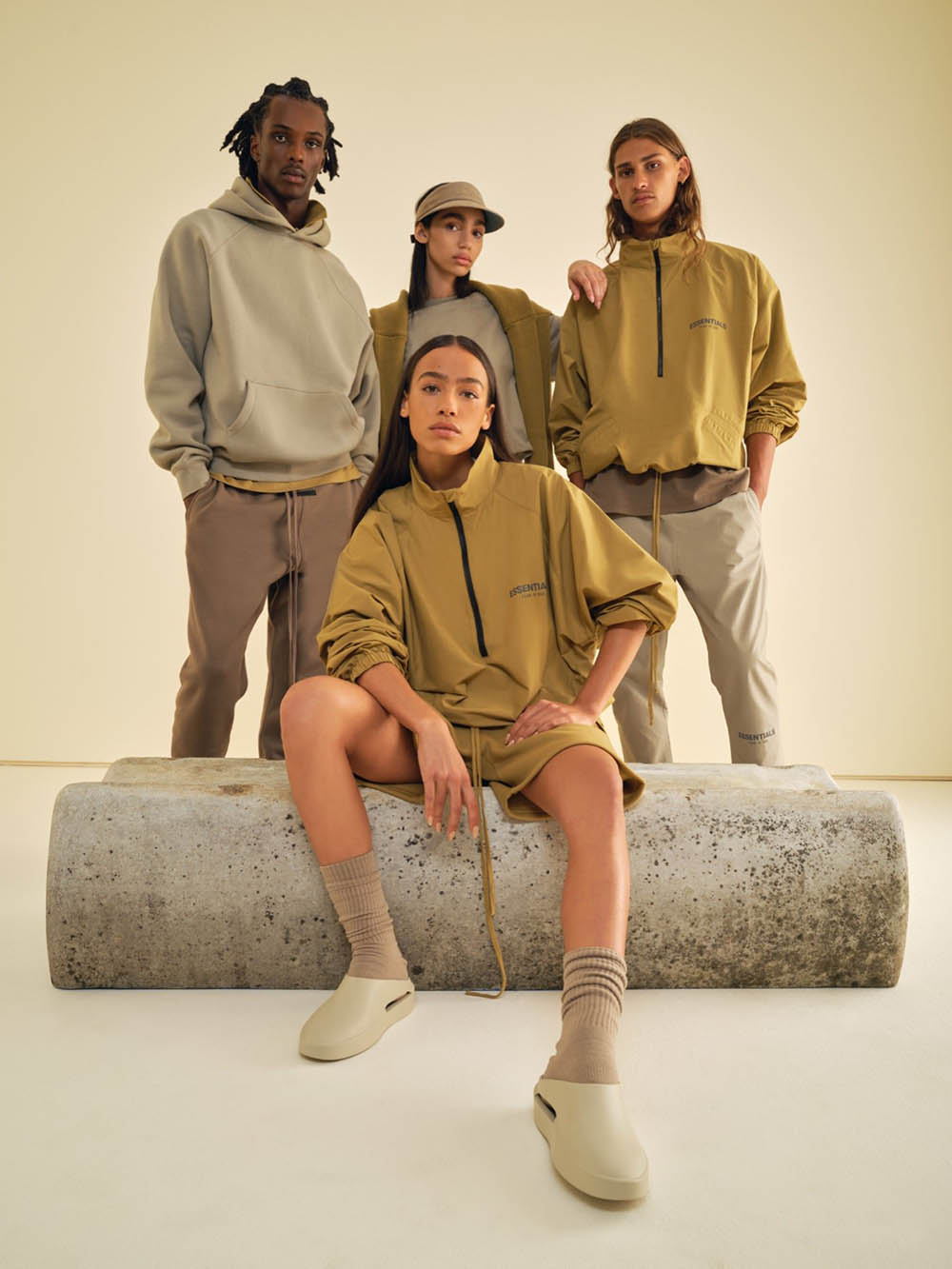
Fear of God Essentials: A Case Study in Launching a Successful Streetwear Line
Share
You've probably heard about streetwear, it's everywhere these days.
From celebrity closets to local skateboard parks, this fashion phenomenon has dominated the apparel industry.
But what does it take to launch a successful streetwear line? Well, sit back and buckle up, because we're going to delve deep into a case study of one of the most triumphant brands in the industry - Fear of God Essentials.
We'll pull back the curtain, allowing you to peek into the strategies that catapulted this brand to international fame.
The Origin of Fear of God Essentials
Let's set the stage with a little backstory. Picture yourself in the shoes of Jerry Lorenzo, the mastermind behind Fear of God.
Ambitious and with a strong sense of style, he took his passion for design and created something extraordinary. Fear of God, a brand that single-handedly redefined the notion of streetwear.
Jerry Lorenzo launched Fear of God in 2013, capitalizing on a gap he spotted in the market. He recognized a rising demand for apparel that blurred the lines between luxury and casual streetwear.
Think of it as having a gourmet cup of specialty coffee in a laid-back coffee shop; it's the perfect blend of class and comfort. That's what Lorenzo envisioned with Fear of God.
Now, let's talk about Fear of God Essentials - an offshoot of the main brand. The 'Essentials' line is like bread and butter. The most basic yet necessary parts of a clothing collection.
Imagine a wardrobe without a classic white tee or a good pair of jeans. Feels incomplete, right? That's where Fear of God Essentials steps in, providing timeless, comfortable, high-quality pieces that are, well, essential.
The Essential line's core principles are simple and yet so profound. It's about focusing on the everyday, the pieces you reach out for again and again. Creating clothing that forms the backbone of a wardrobe, with each item designed to complement all the others.
In essence, the essentials line embodies the philosophy of 'less is more'.
Understanding the Streetwear Market
Pause for a moment. Picture the streetwear market as a bustling city. The streets are lined with shops of every kind, from humble stalls to glitzy boutiques.
It's vibrant, competitive, and ever-changing, much like the fashion it champions. The streetwear market is about selling a dynamic lifestyle and attitude as much as it's about selling clothing.
Fear of God Essentials' is a brand that understands the essential tenants of streetwear. Let's peel back the layers:
1. Embracing Rebellion and Individuality
One of the standout features of Fear of God Essentials is its dedication to oversized fits and minimalist designs.
While the industry was veering towards tight-fitting and heavily branded items, Fear of God Essentials embraced the opposite.
Their baggy sweatpants, oversized tees, and hoodies became a rebellious answer to mainstream streetwear. This design choice is a nod to the urban and underground cultures, where comfort and self-expression hold more weight than following fleeting fashion trends.
2. The DIY Ethos of Essentials
Fear of God Essentials, while a luxury brand, doesn't shy away from raw, unpolished aesthetics that are reminiscent of streetwear’s DIY roots.
The brand's pieces often exude an unfinished charm—a nod to the age-old practice of custom tees and personalized sneaker designs, reflecting a culture that values personal touch and storytelling over mass production.
3. Branding Through Stories
Fear of God's branding doesn't just plaster their logo everywhere.
Instead, Jerry Lorenzo often shares personal stories, inspirations, and moods behind each collection. For instance, Lorenzo has spoken about the influence of '90s grunge and hip-hop on his designs, reflecting a nostalgia for a time of raw, unapologetic individuality.
4. Delivering Experience Over Mere Product
Fear of God Essentials has perfected the art of 'drops'. These limited releases help create unforgettable buying experiences.
The exclusivity, buzz, and sheer excitement surrounding an Essentials release echo the heartbeat of streetwear culture, prioritizing experience and community over mere transaction.
Key Strategies for Success
All right, now that we've grasped the soul of the streetwear market, let's talk strategy. Let's explore how Fear of God Essentials turned itself into a streetwear titan.
Creating Hype: Limited Editions and Drop Culture
Picture this: You're at an auction, and there's a rare artifact up for grabs. The atmosphere is electric, and the anticipation is palpable.
That's exactly what the 'drop culture' feels like in the streetwear world. Brands release a limited number of pieces, and fans scramble to get their hands on them.
It's an adrenaline rush, a race against time, and Fear of God Essentials knows how to orchestrate this frenzy to perfection. By adopting this strategy, they've managed to create anticipation and demand, which adds value to their brand.
The Power of Collaborations
Collaborations in streetwear are like the ultimate mashup of your favorite songs. They combine the strengths of different artists to produce something unique and exciting.
Fear of God Essentials have collaborated with several high-profile brands like Adidas and Essentials, creating exclusive collections that fans can't resist. This strategy not only boosts their visibility but also expands their reach to the fan bases of the collaborating brands.
Influencer Marketing and Celebrity Endorsements
Let's face it, in this era of social media, influencers wield enormous power. A single Instagram post from a top influencer can send sales rocketing.
Fear of God Essentials has adeptly utilized influencer marketing and celebrity endorsements to build their brand. Stars Justin Bieber have been seen flaunting Fear of God apparel, creating aspirational value among fans.
Balancing Accessibility and Exclusivity
Here's the tricky part. Imagine walking a tightrope; on one side is the need to be exclusive to maintain your brand's allure, and on the other, the need to be accessible to reach more customers.
Fear of God Essentials has achieved this balance with grace. They've made their products available enough to build a strong customer base but scarce enough to retain that sought-after status.
By understanding the market and employing these strategies, Fear of God Essentials has hit a home run in the streetwear scene.
Unpolished Campaigns and Imagery
Fear of God Essentials' campaigns often stray from the polished, perfected images of many luxury brands.
Instead, their shoots might showcase models in raw, unfiltered settings, perhaps an urban alley or a rustic basketball court.
This imagery taps into the essence of street culture, positioning the brand as an authentic voice amidst a chorus of commercialism.
Product Design Philosophy
So, what does Fear of God Essentials bring to your wardrobe?
Comfort and Chicness. Relaxation and refinement. That's precisely what Fear of God Essentials aims for with their "luxury meets casual" approach.
With streetwear, the look and feel of the clothes matter. Fear of God Essentials skillfully balances comfort and style.
But they don't stop at just style. Quality is the backbone of their brand. It's like buying a premium car – you expect it to look good, feel good, and last long. Fear of God Essentials offers this through their meticulously crafted apparel.
The Impact of Digital and Social Media
Social media is the 21st century's word-of-mouth. It's the modern-day billboard, the newspaper ad of our times. It's fast, it's effective, and it's an integral part of the streetwear culture. Fear of God Essentials has harnessed this power to their advantage, using platforms like Instagram and Twitter to connect with their audience, much like a band would interact with their fans at a concert.
They've used social media to announce product drops, creating a buzz around their releases. Remember the thrill of waiting for a new movie trailer to drop? That's the kind of anticipation they create among their followers.
But it's not just about marketing. Social media is also a space for them to engage with their community, to understand what their customers want, and to provide them with a personalized brand experience. It's like having a direct line to your favorite musician, where you can share your thoughts and feedback.
In the world of e-commerce, Fear of God Essentials has used these digital platforms to simplify the shopping experience. With user-friendly websites and seamless online services, buying Fear of God Essentials products is as smooth as can be.
Sustainability in Streetwear: The Fear of God Essentials Approach
In the age of fast fashion, where clothes are often worn once and then forgotten, Fear of God Essentials goes against the current. Their mantra is to create timeless essentials that will stay relevant in your wardrobe for years, reducing the need for excessive consumption. It's like investing in a classic vinyl record over a trendy single; it never goes out of style.
Moreover, Fear of God Essentials is conscious about their materials and production processes. It's like choosing to cook a healthy, home-made meal instead of grabbing fast food; it takes more effort, but the results are worth it. They aim to minimize their environmental impact without compromising on the quality of their products.
The response from the market and customers has been positive. Just like the satisfaction you get from planting a tree and watching it grow, knowing that your purchase contributes to a more sustainable future gives a deeper meaning to fashion
The Bottom Line
And there you have it. That's the journey of Fear of God Essentials in a nutshell. It's been quite a ride, hasn't it?
Looking back, it's clear that understanding the streetwear market was a vital part of their success. They tapped into the heart of their audience. From being authentic to embracing the 'drop culture,' to leveraging collaborations and digitial storytelling, they've ticked all the right boxes.
In terms of design, their 'luxury meets casual' philosophy was a game-changer. It takes simple ingredients and takes them from good to great. By focusing on quality and comfort, they created timeless essentials that customers couldn't resist.
